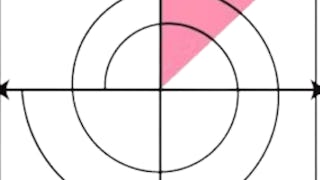This course will discuss different ways of formally modeling requirements of interest for autonomous systems. Examples of such requirements include stability, invariance, reachability, regular languages, omega-regular languages, and linear temporal logic properties. In addition, it will introduce non-deterministic finite and büchi automata for recognizing, respectively, regular languages and omega-regular languages.


Requirement Specifications for Autonomous Systems
本课程是 Foundations of Autonomous Systems 专项课程 的一部分

位教师:Majid Zamani
包含在  中
中
您将学到什么
Utilize formal methods to specify and verify requirements for autonomous systems.
Model system behaviors and verify stability using various analytical methods.
Apply reachable set computation and robustness analysis in system design.
您将获得的技能
要了解的详细信息

添加到您的领英档案
6 项作业
了解顶级公司的员工如何掌握热门技能

积累特定领域的专业知识
- 向行业专家学习新概念
- 获得对主题或工具的基础理解
- 通过实践项目培养工作相关技能
- 获得可共享的职业证书

该课程共有5个模块
In this course, we delve into both low-level and high-level specifications, fundamental to the development of safe autonomous systems. This module is specifically designed to equip students with an in-depth understanding of expressing system behaviors through formal methods, including linear temporal logic and automata on both finite and infinite strings. Through a collection of detailed examples and practical applications, participants will acquire the skills needed to define and analyze key properties of autonomous systems, such as safety and reachability.
涵盖的内容
3个视频10篇阅读材料
This module offers a concise introduction to normed vector spaces and stability concepts in autonomous systems, encompassing both asymptotic stability and global asymptotic stability. It emphasizes the application of Lyapunov's Stability Theorem for the formal verification of these properties in complex systems, including its application to various simple systems, such as linear ones. Through illustrative examples, we will demonstrate the significance of these concepts in analyzing and ensuring the stability of systems.
涵盖的内容
14个视频1篇阅读材料1个作业
Delve into the topic of reachable sets and uncover their critical role in guaranteeing system safety. This module introduces frameworks for exploring computational techniques to over-approximate reachable sets across diverse system classes. You will have the chance to apply your knowledge in real-world contexts, investigate the use of zonotopes, and recognize their beneficial properties in the computation of reachable sets. Moreover, we delve into fundamental concepts of formal languages, and regular and omega-regular expressions, offering succinct and formal methods to express regular and omega-regular languages, respectively.
涵盖的内容
7个视频1篇阅读材料1个作业
This module immerses you in the essential principles of regular and ω-regular properties and how they are represented via non-deterministic finite automata (NFA) and Büchi automata (NBA), respectively. You will study the notation and architecture of NFAs and NBAs, master the construction of regular and ω-regular expressions, and grasp their correlation with these automata. The course will navigate you through the conversion of NFAs to regular expressions and NBAs to ω-regular expressions and the inverse, elucidating the significance of these concepts in the verification of finite and infinite behaviors of systems.
涵盖的内容
13个视频1篇阅读材料2个作业
This module provides an in-depth exploration of Linear Temporal Logic (LTL) formulas, a mathematical formalism for describing languages containing infinite words. It presents a framework for articulating the temporal dimensions of system behaviors, offering a syntax that closely mirrors natural language. By melding propositional logic with temporal operators, LTL furnishes a powerful toolkit for specifying the rich behaviors of systems.
涵盖的内容
3个视频1篇阅读材料2个作业
获得职业证书
将此证书添加到您的 LinkedIn 个人资料、简历或履历中。在社交媒体和绩效考核中分享。
攻读学位
课程 是 University of Colorado Boulder提供的以下学位课程的一部分。如果您被录取并注册,您已完成的课程可计入您的学位学习,您的学习进度也可随之转移。
位教师

从 Design and Product 浏览更多内容
 状态:免费试用
状态:免费试用University of Colorado Boulder
 状态:免费试用
状态:免费试用University of Colorado Boulder
 状态:免费试用
状态:免费试用University of Colorado Boulder
 状态:免费试用
状态:免费试用University of Colorado System
人们为什么选择 Coursera 来帮助自己实现职业发展




常见问题
To access the course materials, assignments and to earn a Certificate, you will need to purchase the Certificate experience when you enroll in a course. You can try a Free Trial instead, or apply for Financial Aid. The course may offer 'Full Course, No Certificate' instead. This option lets you see all course materials, submit required assessments, and get a final grade. This also means that you will not be able to purchase a Certificate experience.
When you enroll in the course, you get access to all of the courses in the Specialization, and you earn a certificate when you complete the work. Your electronic Certificate will be added to your Accomplishments page - from there, you can print your Certificate or add it to your LinkedIn profile.
Yes. In select learning programs, you can apply for financial aid or a scholarship if you can’t afford the enrollment fee. If fin aid or scholarship is available for your learning program selection, you’ll find a link to apply on the description page.
更多问题
提供助学金,



